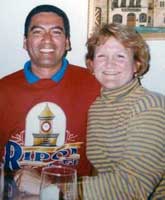Racial profiling behind brutal killing?
By
Larry Hales
Published Dec 15, 2005 11:22 PM
Air marshals shot Rigoberto Alpizar to death on
Dec. 7 on a boarding bridge to an American Airlines jet in Miami International
airport. The naturalized U.S. citizen—Alpizar was born in Costa
Rica—and his wife had just boarded the plane for a short flight to Orlando
after returning to Florida from a trip to Peru.
|
Rigoberto Alpizar and his wife,
Anne Buechner
|
Initial reports given by
the two air marshals who shot Alpizar stated that he yelled he had a bomb before
running off the plane and reaching into his backpack. However, several witnesses
have come forward and stated that Alpizar never yelled he had a bomb.
Passenger Mike Beshears told reporters, “He just was in a hurry and
exited the plane.”
Another passenger, John McAlhany, stated,
“I heard him saying to his wife, ‘I’ve got to get off the
plane.’ He bumped me, bumped a couple of stewardesses. He just wanted to
get off the plane.”
In fact, not one witness has come forward to
substantiate the claims of the air marshals who brutally shot Alpizar, a
mentally disabled man diagnosed with bipolar disease.
The government
agents claimed they were justified in the shooting and have the right to
“neutralize” a suspect deemed a threat. Alpizar was clearly no
threat. He was unarmed and made no threatening motions to anyone. He merely
wanted to get off the plane.
His wife, Anne Buechner, who was behind him
as he tried to exit the aircraft, told the air marshals that her husband was
bipolar, that he was harmless but had been off his medication. Her words went
unheeded. Moments later, after Alpizar left the aircraft, followed by two
marshals, the 44-year-old Home Depot worker was gunned down.
John Amat, a
federal official and a deputy with the U.S. Air Marshals service in Miami, said
the marshals had the right to shoot to stop the “threat” and even
repeated their story that Alpizar had said he had a bomb. Amat wasn’t
there, and not one passenger recalled hearing him say anything about a bomb.
They first heard the word from the FBI when being questioned.
“They
kept asking if I heard him say the B-word. And I said, ‘What is the
B-word?’ And they were like, ‘Bomb.’ I said no. They said,
‘Are you sure?’ And I am,” said passenger McAlhany, a
construction worker.
This shooting is very similar to the killing of Jean
Charles de Menezes in London. The police who shot the young Brazilian worker
there were caught lying from beginning to end.
They said Menezes was
wearing a bulky jacket, that he appeared agitated, and that he jumped a
turnstile and ran into a subway car. However, videotape doesn’t lie, nor
did witnesses. The video showed a calm young man in a light jeans jacket who
used a subway card and walked, rushing only to catch his train. He was grabbed
by several cops while sitting in the subway car, was knocked to the floor and
shot at point-blank range.
Had Menezes been agitated or nervous, he would
have had due cause. The British government had just given greater profiling
powers to cops and authorized them to use deadly force after a group of bombings
on subway cars. These had been attri buted to anger among young Mus lims over
the brutal war in Iraq and Britain’s junior partnership with American
imperialism. It kicked up rampant racism against people of Middle Eastern,
Indian and South East Asian descent, as well as from Latin America, the
Caribbean and Africa.
The two shootings highlight the racism that is
endemic to the U.S., Britain and France. While the police of all these
imperialist countries are used to beat down workers and “keep them in
their place,” the violence and brutality is especially intense against
people of color and occurs daily. That is why the outlying ghettos of Paris
burned recently. Young North and Sub-Saharan African youth expressed outrage by
rebelling in the streets after two youth died while being hunted by
cops.
The youths’ righteous clamor came after years of brutality by
cops and years of oppression and poverty. That outcry can be heard in oppressed
communities throughout the United States, and it should indeed be extended to
the racist profiling involved in the Alpizar shooting.
Articles copyright 1995-2012 Workers World.
Verbatim copying and distribution of this entire article is permitted in any medium without royalty provided this notice is preserved.
Workers World, 55 W. 17 St., NY, NY 10011
Email:
[email protected]
Subscribe
[email protected]
Support independent news
DONATE


